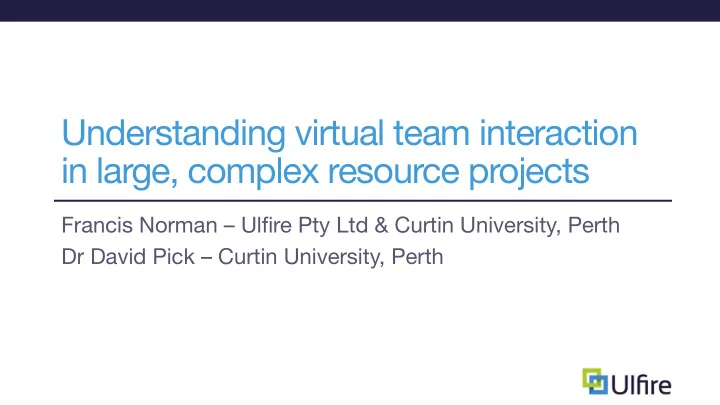

Understanding virtual team interaction in large, complex resource projects Francis Norman – Ulfire Pty Ltd & Curtin University, Perth Dr David Pick – Curtin University, Perth
Disclaimer • The following contains extensive use of Qualitative data. • Guidance is recommended for those relying only on quantitative data. • No statistics were harmed in the preparation of this presentation
Background • Francis Norman AFIEAust CEngA, IEng MInstMC, MAIPM, MAICD • MSc in Project Management completed 2010 • 31 year career in EPC/EPCM, greenfield and brownfield projects, 22 in technical roles, 9 as engineering manager • International experience working for extended periods in India, Brazil, South Korea, Germany and Norway • 2015 Engineers Australia WA Division President
Research structure
Research background • PhD research commenced in 2011 (planned completion 2016) • Investigating interpersonal communications within virtual project teams delivering engineering projects into the WA resources sector. • Qualitative approach, interviewed project team members both in Perth and other o ffi ces in each organisation participating in the research. • 35 interviews conducted between early 2012 and mid 2013
Demographics External Outside of Perth Cohort Perth (6 pax) Project 1 4 5 Adelaide Tier 1 EPCM Project 2 Sydney 4 4 Tier 1 Supplier Project 3 Singapore 2 3 Tier 1 Engineer/ Supplier Project 5 D = 3 Dubai & 2 Tier 1 Consultancy S = 2 Sydney Completed Completed Sub total 17 Sub total 12
Findings Results from analysis of data so far
People “ Projects are about people, if you get the people element right, the project will generally get delivered, but if you get it wrong, then your project’s in serious trouble ” Project Director
Task Complexity
Organisational Structure
Organisational Structure
Organisational Structure
Culture
Contractual Inter-o ffi ce Relationship
Task Allocation
Schedule and Budget for Virtualisation
Geography
Time and temporality
Language Språk linguagem 언어 ةغل ภาษา iaith ngôn ng ữ ভাষা язык 言語 bahasa نابز γλώσσα wika taal 语⾔訁 भाषा �ష Ulimi linguagem
Trust
Putting it together
Systems and Processes Encompassing Systems • Organisational structure to and support the work processes • Levels of Authority • Division of labour • Reward mechanisms Technical • Procedures Affect Skills • IT networks and tools
Technical Skills Encompassing Systems • Skills of personnel engaged in and the work processes • Costs and availability of personnel • Level of relevant task experience Technical Affect Skills
A ff ect Encompassing Systems • Emotional commitment to the and project processes • Trust • Belief in virtual teams approach • Relationships with virtual Technical colleagues Affect Skills • Ability to deal with higher levels of ambiguity • Willingness to communicate
Systems & Processes plus Technical Skills • Strong operating system Systems supporting the virtual team work and and skilled technical personnel. processes • Potentially the personnel may not be committed to the project • It appears that this is the most prevalent combination Technical Affect Skills
Systems & Processes plus A ff ect • Structured operating systems Systems that support virtual team work and • Committed personnel processes • Potentially suboptimal technical skills within the team Technical Affect Skills
Technical Skills plus A ff ect • Skilled and proficient personnel Systems committed to the outcome of and the project. processes • Potentially suboptimal systems and processes in place to support the endeavour Technical Affect Skills
Balance • The best outcomes appear to Systems come from projects with a more and even balance; processes • Where the processes support the structure • Where personnel have appropriate skills for their assigned work Technical • Where personnel have an emotional Affect Skills commitment to the project and their colleagues
Observations • Many organisations have good systems, but these systems are often built for single location execution. In many cases these do not adapt well to multi-centre work. • IT systems are no substitute for personal contact, face to face meetings. • Rewarding management based on the P&L of individual centres may well inhibit genuine open collaboration. • Meeting face to face builds trust and personal relationships which in turn lead to improved a ff ect .
Observations • Hiring on technical skills alone is not enough… The best technical person may not be the “best fit” communicator. • High turn over has as large, or even larger impact on multi centre work as it does in a single centre project. • Not every PM is suited to multi centre work, it demands additional characteristics such as high tolerance for ambiguity, not a typical PM characteristic • Richer communications is not always better, • Those running the projects tended to prefer to use video • But those delivering technical scope were happy with email, telephone and shared documents.
The challenge is “ trying to get people to do what you want or, getting people to want to do what you want them to do ” Project Engineer
Thank you Francis.norman@ulfire.com.au @FrancisNorman
Recommend
More recommend